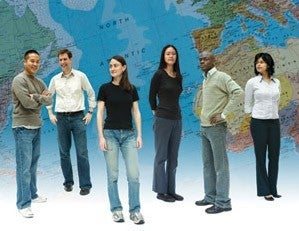[ Winter 2008 ]
A poor mother in Ghana looking to buy anti-malaria pills for her baby has few options. Pharmacists, if there are any nearby, may charge more than she can afford, forcing her to seek medicine from a street vendor. But in open-air markets in Ghana, as in many developing countries around the world, there’s a good chance those drugs will be fake—diluted with inert or toxic ingredients that exacerbate drug resistance or, worse, kill the patient.
The counterfeit drug trade, like many public health crises, is a problem governments and aid agencies have tried to solve with money for decades, in this case by pouring dollars into educational campaigns and subsidies to make essential medicines more affordable. But so far, they’ve had limited success. Global sales of counterfeit medicine could reach $75 billion a year by 2010, according to the Center for Medicine in the Public Interest, a health care policy group in New York.
“If you’re using a philanthropic model or a public health model that says you subsidize the effort, the number of poor will overwhelm the resources you have. Always,” says Michael Chu, a senior lecturer at the Harvard Business School (HBS). As a financial strategist, Chu has worked in microcredit banking, now a booming industry in the developing world that offers loans ranging from $10 to several thousand dollars to the working poor to expand businesses and pay for health care or education. The best of these banks are highly profitable, Chu says, not only because there are so many poor people, but also because they are good credit risks. In countries that lack social and government safety nets, Chu says, “Whatever little the poor have, they’ve paid for it themselves.”
Profiting from good works
Now, economists and business analysts have begun to apply this lesson—that the poor can benefit from profits created by business—to global health issues. Chu and David Bloom, the Clarence James Gamble Professor of Economics and Demography at the Harvard School of Public Health (HSPH), are co-directing a two-year-old joint effort between HSPH and HBS known as Project Antares. The project’s ultimate goal, Bloom says, is to launch ventures to address health problems that cripple people’s ability to earn a living; these medical issues include malaria, HIV/AIDS, tuberculosis, diabetes, and threats unique to pregnant women and their babies. The point is not to make money for money’s sake, but to “simultaneously do well financially by doing good socially,” says Bloom.
Last winter, Bloom and Chu launched a new, semester-long course in which three teams of six students from HBS and HSPH each wrote a business plan aimed at promoting health. One team envisioned a company that trains and equips midwives in Pakistan, where maternal and infant mortality rates are among the world’s highest. Another team designed a daytime variety TV show for Peru focused on women’s health that would imbed educational information about nutrition or sexually transmitted diseases within segments about beauty, style, and popular culture. The show, whose income would rely on product placement, would also include a “telenovela,” a form of soap opera popular in Latin America.
“You could have a pregnant character who’s not feeling well, goes to the doctor, and begins to take vitamins,” says Sara Green, a second-year HSPH master’s student in the Department of Population and International Health. “The idea is that it’s not overt.”
A third group took on Ghana’s counterfeit drug problem. Their original idea was for a business that sold antimalarials packaged with unique serial numbers that could be verified using cell phones. Early on, however, team members realized that cell phone penetration is not high in rural areas, where counterfeiters thrive. So the team decided to attack the problem at its source, and they proposed a franchise of pharmacies that, through advertising and education campaigns, would become a trusted brand because it guaranteed authentic drugs at good prices.
You have to be there
These were ambitious plans, and all had compelling aspects, says Roslyn Payne, HBS ’70, a private investor in California who is the primary donor behind Project Antares. Generous grants have also come from the Brinson Foundation. But are the students’ plans viable? Payne finds the Ghana project particularly interesting, given that similar pharmacy chains have succeeded in Mexico and elsewhere. One risk inherent in the Peruvian project is that it’s hard to predict whether a TV show will catch on. And, as Payne notes, it’s hard to measure its influence on viewers.
All three projects were limited by the fact that team members weren’t visiting the countries they were writing about. “We don’t understand the area, the context,” says Joel Segre, a second-year business student. Bloom and Chu hope to include field work in the course’s next iteration. They and Project Antares team members are now deciding whether and how to move their ideas forward, ideally by engaging investors in the home countries.
Overall, students were effusive about the course, particularly its fusion of two very different professional cultures. “It was working with the business students that I found very useful, very eye-opening,” says second-year HSPH master’s student Victoria Fan. “I feel I’ve learned to think more pragmatically, as they’re used to doing.”
Katharine Dunn has written about science and health for Harvard Magazine, the Boston Globe, and Technology Review.
